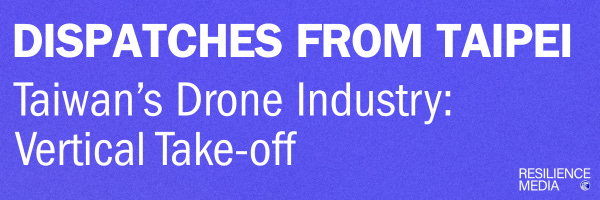Taiwan's Rising Position in the Defence Tech Industry: From Bayonet Training to Drone Exports in 24 Months
The geopolitical threat to democracy is not limited to Russia, as citizens and the leadership of Taiwan know all too well.
The geopolitical threat to democracy is not limited to Russia, as citizens and the leadership of Taiwan know all too well. The looming spectre of China has led to a rapid pace of change in the Taiwanese military to meet modern threats. Since we founded Resilience Media we’ve been watching Taiwan’s response to China from afar, noting its close ties to other small countries with a risky neighbour, as well as forming partnerships with companies operating on the Ukrainian front lines, like Auterion.
Today we bring you our first piece of coverage from Taiwan, excerpted below in our Dispatches from Taipei section. Until recently an incredibly conservative military, Taiwan has accelerated its position within the defence tech industry; taking its knowledge of chip manufacturing and applying it to drone exports, as well as importing mass to use as deterrent. Speaking to Resilience Media, Auterion Founder and CEO Lorenz Meier said that “Taiwan has stepped up its investment in drones dramatically and offers a red-free supply chain to international partners.” From our reporting, we can see that starting to emerge.
How else will a country the size of the Netherlands and Switzerland be able to scale without critical partnerships in the West? The answer seems to be to scale existing manufacturing capability, export a ton of drones, then pivot to arm oneself when the threat is imminent. This blueprint is what we highlighted in our Future of Defence Tech Manufacturing and Innovation event at Munich Security Conference in February 2025, where Meier spoke on our stage about partnerships and production capacity alongside Klaus Kappen, CTO of Rheinmettal. Auterion was building the relationship with Taiwan in early 2025 and Meier told me “Taiwan has recognised that drones are key for national defence and has adopted a software defined warfare strategy. We are excited to work closely with Taiwan to build autonomous mass.”
This is the first of many pieces we will be bringing you on the startup and defence industry in Taiwan. Got anything you want us to cover? Send us a note.
Are you going to Slush? We are and we’re co-hosting a unique side event with Project A, IQT, NIF, Stark, Lakestar, and DIANA. Join us by registering here.
Taiwan, the centre of the world’s advanced semiconductor industry, has often frustrated external military analysts for failing to translate that technological manufacturing prowess into defensive capability. Its military has long been seen as old-fashioned, with some justification: only last year did the Defence Minister announce an end to bayonet training.
Things started to change, though, in 2022. In the summer of that year, as reported by Reuters, then Taiwanese President Tsai Ing-wen was briefed about the importance of drones on the battlefield in Ukraine.
It was a lesson in how low-cost drone technology could be used to repel a much larger foe. But it was also a wake-up call. The Taiwanese military had just “hundreds” of drones of just a handful of types, compared to the estimated tens of thousands of drones in 50 different types on the other side of the Taiwan Strait.
Tsai’s administration put together a “Drone National Team” to ramp up Taiwan’s capability, inaugurating a drone development and production centre in the southern county of Chiayi, whose varied geography makes it suitable for testing drone types in different conditions.
But the official thinking has since shifted even more. The previous administration under Tsai wanted Taiwan to be a home for drone manufacturing. The current Lai administration, which took power in 2024, has loftier aims. In March, it announced plans to position Taiwan as the “Asia-Pacific Hub for the Democratic Drone Supply Chain.”
Drone technology is improving extremely rapidly. As Hong-Lun Tiunn, deputy director of the National Security Programme at Taiwan’s Research Institute for Democracy, Society, and Emerging Technology (DSET) told Resilience Media, it would make little sense for the Taiwanese military to stockpile large quantities of weapons that are so quickly outdated. Taiwan’s plan, rather, is to export abroad, building up massive homegrown productive capacity which it could then focus on its own defence if needed.
Some demand still comes from the Taiwanese military. In July, an armaments notice showed that the Ministry of National Defence plans to acquire 48,750 military-grade commercial drones over the next two years. But many analysts argue that number is too low both to provide enough demand to justify investments needed to secure a 100% Taiwanese supply chain, and also for defence purposes.
Ellen Chang, managing director for defence instructure at CapZone Impact Investments, reportedly told a symposium hosted at the Taiwanese legislature that “50,000 is not going to cut it. “In fact … maybe you need to multiply that by like 100,000 and maybe that’ll start to actually mobilize the manufacturing lines.”
Meanwhile, budget squabbles in the legislature this year have led to concerns about the reliability of some pockets of future government funding.
Follow Resilience Media on LinkedIn and Bluesky to catch our latest news coverage in your feed. And don’t be shy, bring your voice to the discussion.



